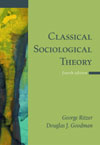
August Comte |  |
Learning ObjectivesAfter reading this chapter, students should be able to:
- define Comte's version of positivism, discuss his realism, and identify his four major methodologies;
- identify and define Comte's three stages, as well as the law of the three stages;
- discuss Comte's conception of sociology;
- discuss the intellectual, social, and political context in which Comte developed his sociology (e.g., the aftermath of the French Revolution);
- discuss Comte's notion of order and progress, as well as their relationship to the law of the three stages;
- discuss Comte's idealism and contrast it to Karl Marx's materialism;
- distinguish between social statics and social dynamics;
- identify the role of the individual in Comte's sociology and contrast egoism and altruism;
- discuss Comte's views on the roles of the family, religion, the division of labor, and language, as well as their effects on individuals;
- identify the connection between theory and practice in Comte's sociology;
- discuss Comte's views on the roles of women and the working class;
- recount Comte's schemes for the future;
- identify Comte's contributions to contemporary sociology; and
- critically assess Comte's work.
|
|